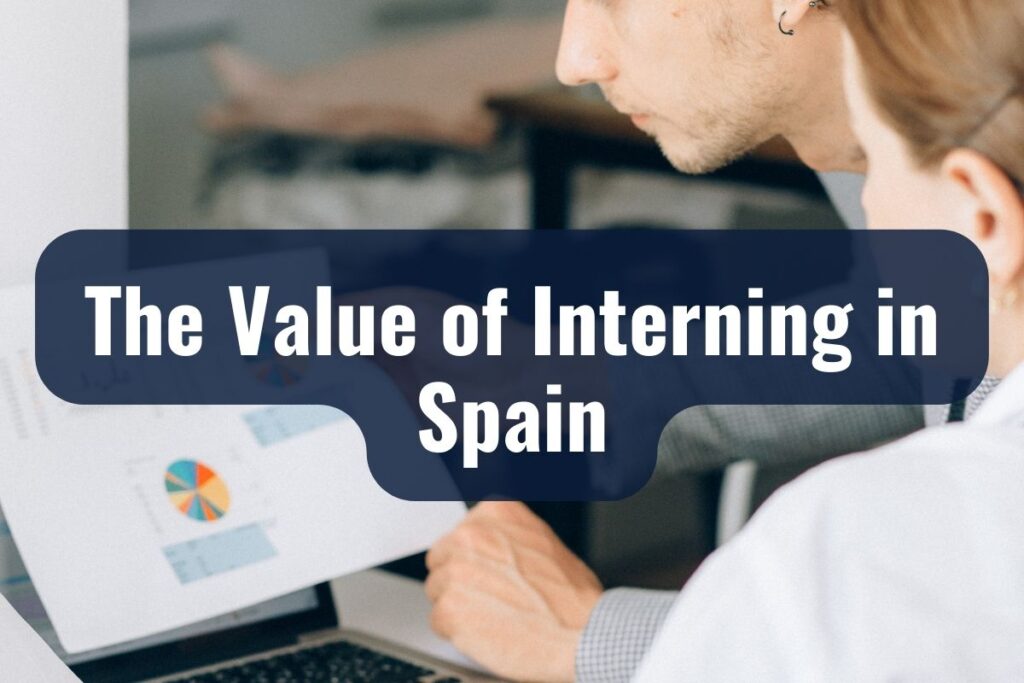Spain is gradually emerging as a pivotal hub for young professionals and students looking to broaden their horizons.
We take a look at the intricacies of undertaking an internship in this beautiful country – from understanding the different sectors that welcome international interns to tips on embracing the Spanish work culture.
KEY TAKEAWAYS
- Spain offers a rich blend of professional and cultural experiences for interns.
- Internships in Spain enhance global perspectives and provide unique networking opportunities.
- Multiple sectors, from tech to arts, offer diverse internship possibilities.
- While Spanish is prevalent, English is also widely accepted in professional environments.
- Legal and visa considerations are paramount, with requirements varying based on nationality.
- Tailoring your CV to Spanish norms and leveraging networking can be pivotal in securing the right internship.
The Value of Interning in Spain

Enhancing Global Perspective and Intercultural Skills
In an increasingly interconnected world, the ability to understand and navigate diverse cultural landscapes is invaluable. Spain offers interns a chance to develop a truly global perspective. An internship here not only equips individuals with specialized skills in their chosen field but also hones their ability to communicate, adapt, and work efficiently in multicultural environments.
Building Professional Networks in a European Context
Spain is home to a plethora of international companies, startups, and renowned academic institutions. Interning in such a dynamic environment allows individuals to create and cultivate connections that span across industries and borders. These networks can prove pivotal in one’s career, opening doors to job opportunities, collaborations, or further studies not just in Spain but across Europe.
Gaining Firsthand Experience in Spain’s Unique Business Culture
While textbooks and online resources can provide a theoretical understanding of Spain’s business practices, there’s no substitute for the real-life experience. By interning in Spain, individuals get an insider’s view of how businesses operate, from formalities and hierarchy to the quintessential Spanish “sobremesa”—the art of conversation after meals. This immersion into the Spanish professional ethos can provide a distinctive edge in the global job market.
Furthermore, the country’s approach to work-life balance, community involvement, and emphasis on interpersonal relationships can offer fresh perspectives and inspire individuals to think differently about their career paths and aspirations.
Types of Internships Available
Industry-based Opportunities
Spain’s diverse economic landscape means that there’s likely an internship opportunity for almost every field of interest. Some of the prominent sectors include:
Tech
With cities like Barcelona emerging as tech hubs, there are numerous opportunities for internships at startups, software development firms, and digital marketing agencies.
Finance
Spain’s robust banking sector, including giants like Banco Santander and BBVA, provides ample opportunities for those inclined toward finance, banking, and economics.
Arts
For those drawn to the creative side, Spain, with its rich artistic heritage, offers internships in museums, galleries, theaters, and film production companies.
Tourism and Hospitality
Given that tourism is one of the pillars of the Spanish economy, there are myriad roles available, from hotel management to travel consultancy.
Academic Internships Affiliated with Universities
Many universities in Spain have tie-ups with industries and offer structured internship programs for students. These internships are often curated to ensure that the learning at the academic institution is complemented with hands-on industry experience.
Institutions such as the University of Barcelona, the Autonomous University of Madrid, and the University of Seville are just a few of the numerous establishments offering such programs.
NGO and Nonprofit Sectors
Spain is home to various NGOs and nonprofit organizations working in diverse areas like environmental conservation, social work, education, and public health. An internship in this sector not only provides professional experience but also offers a chance to contribute positively to society.
Language Barriers

The Role of English in the Spanish Professional Environment
One of the initial apprehensions for foreigners interning in Spain might revolve around the language. While Spanish is the predominant language of business and daily life, it’s heartening to note that English has made significant inroads into the Spanish professional world, especially in larger cities and globalized sectors.
Many multinational companies, tech startups, and academic institutions often have English as a working language, making it relatively easier for non-Spanish speakers to adapt.
Benefits of Picking Up Essential Spanish Phrases
While a comprehensive grasp of Spanish might not be obligatory, learning a few essential phrases can greatly enrich your internship experience. Simple gestures like greeting colleagues with a warm “Buenos días” or expressing gratitude with “Gracias” can foster camaraderie and facilitate smoother interactions.
Moreover, a basic understanding of Spanish can be immensely beneficial in daily life, from shopping to using public transport.
Opportunities to Learn Spanish Alongside the Internship
Spain is dotted with language schools and institutions offering courses tailored to various proficiency levels. Many foreigners use their internship period as a golden opportunity to pick up or improve their Spanish skills. Immersion is one of the best ways to learn a language, and what better place to learn Spanish than in its native land?
Additionally, language exchange meetups, commonly known as “Intercambios”, are popular in many Spanish cities. These informal gatherings allow participants to practice Spanish with locals, who in turn get an opportunity to practice English or another language.
Legal and Visa Considerations
Embarking on an international internship is an exhilarating journey, but it’s crucial to ensure that all legal and visa aspects are meticulously addressed. While the process might seem intricate, understanding the requirements can significantly simplify the journey.
Basic Requirements for Foreign Interns
Before diving into visa-specific details, it’s imperative to be aware of the foundational prerequisites:
Internship Agreement
Most companies or institutions in Spain will require an official internship agreement. This document, often provided by the host organization, outlines the terms, duration, responsibilities, and other particulars of the internship.
Valid Passport
Ensure that your passport is valid for the entire duration of the internship, and preferably for several months beyond.
Health Insurance
Spain mandates that all interns, whether from the EU or non-EU countries, have comprehensive health insurance coverage for the duration of their stay.
Process for Obtaining Internship Visas
The specific visa you’ll need often hinges on your nationality and the internship’s duration:
EU/EEA/Swiss Citizens
If you hail from the European Union, the European Economic Area, or Switzerland, you can undertake an internship in Spain without a work permit or visa. However, if the internship exceeds three months, you’ll need to register with the local Spanish authorities and obtain a residence certificate.
Non-EU Citizens
For interns from outside the EU:
Short-term Internships (up to 90 days): A Schengen short-stay visa might suffice.
Long-term Internships (more than 90 days): You’d typically need a long-stay visa, often termed a student visa or internship visa. Along with the visa, a foreigner’s identity card (‘TIE’) is also required, which you can obtain after arriving in Spain.
Necessary Documentation and Timeline
While the specifics might vary depending on your nationality and the Spanish consulate’s requirements in your country, here are some commonly required documents:
- A completed visa application form
- Passport-sized photos
- The internship agreement or offer letter
- Proof of accommodation in Spain
- Evidence of financial means – ensuring you can sustain yourself during the internship
- Health insurance documentation
As for the timeline, it’s judicious to start the visa application process well in advance. While the duration can vary, it’s not uncommon for the process to take a couple of months.
Finding the Right Internship

Deciding to pursue an internship in Spain is a commendable step towards enhancing your professional journey. However, the quest often begins with a pertinent question: How do you find the right internship that aligns with your aspirations and skills? While the search can be an expedition in itself, a strategic approach can pave the way for a rewarding experience.
Platforms and Agencies Specializing in Placing Foreign Interns
In the digital age, numerous platforms cater explicitly to international internships. Websites such as GoAbroad, Intern Abroad, and Erasmus Intern are treasure troves of information and listings for Spain. They not only provide details on available opportunities but often also incorporate reviews and feedback from past interns.
For a more tailored approach, several agencies specialize in matching candidates with suitable internships in Spain. While opting for agencies might involve a fee, the personalized guidance, and streamlined process can often make the investment worthwhile.
Optimizing Your CV and Cover Letter for Spanish Employers
Adapting your CV and cover letter to align with Spanish norms can significantly enhance your chances:
Brevity is Key: Spanish CVs are typically concise, and often restricted to one page for early-career professionals. Focus on highlighting relevant experiences and skills.
Personal Touch: Including a professional photo is common in Spain. Additionally, some employers appreciate a brief personal statement outlining your motivations and aspirations.
Language Skills: Indicate your proficiency in Spanish and English. If you possess certifications for any languages, include those as well.
Your cover letter should be a heartfelt testament to why you wish to intern in Spain, your suitability for the role, and the value you’d bring to the organization.
The Importance of Networking and Attending Industry Events
While online platforms and agencies are valuable resources, never underestimate the power of personal connections. If you’re already in Spain or planning a visit before your internship, consider attending industry events, workshops, or seminars relevant to your field. Such gatherings are not just learning experiences but also networking goldmines.
Engage in LinkedIn discussions related to your industry in Spain. Joining Spain-specific groups and forums can also provide insider tips and occasionally, exclusive internship leads.
Making the Most of Your Internship
Embarking on an internship in Spain is akin to holding a key to a treasure trove of experiences, both professional and personal. But like all treasures, the value is truly realized when explored to its fullest. Here’s how to ensure that your internship journey in Spain is not just about ticking a box but about holistic growth and enrichment.
Embracing Spanish Work Culture and Etiquette
Diving deep into the nuances of Spanish work culture can pave the way for a harmonious and productive experience:
Building Relationships
Spanish professionals often value personal relationships. Take the time to get to know your colleagues, engage in conversations, and participate in team lunches or outings.
Punctuality
While Spain might be known for its laid-back vibe, punctuality is appreciated in the professional sphere. Being on time is a testament to your commitment and respect for others’ time.
Feedback and Initiative
While hierarchies are respected, don’t hesitate to share constructive feedback when appropriate. Simultaneously, showing initiative and a proactive attitude can set you apart.
Exploring Spain Outside of Work: Culture, Gastronomy, and Leisure
Your internship isn’t just about the hours spent within office walls. Spain beckons with its rich tapestry of experiences:
Culinary Adventures
From the tantalizing tapas of Andalusia to the seafood paella of Valencia, let your taste buds revel in Spanish gastronomy. Engage in local culinary traditions, like enjoying churros with chocolate during breakfast hours or savoring a late-night dinner, Spanish style.
Cultural Immersion
Allocate weekends to explore the architectural marvels of Gaudí in Barcelona, the historical grandeur of Granada’s Alhambra, or the vibrant festivals, be it La Tomatina or Semana Santa.
Language Enhancement
Consider enrolling in evening or weekend Spanish classes. Not only will this bolster your language skills, but it’s also a fantastic way to meet fellow enthusiasts and locals.
Building Relationships with Coworkers and Mentors
Forge bonds with your coworkers, superiors, and mentors. These relationships can provide invaluable insights and guidance and might even transform into lifelong friendships or professional collaborations. Attend team outings, engage in brainstorming sessions, and don’t shy away from seeking advice when in doubt.
Challenges and Solutions

Every journey, no matter how enriching, comes with its set of challenges. Interning in Spain, while a transformative experience, is no exception. Recognizing potential hurdles and being equipped with solutions can make the path smoother and more enjoyable.
Spain, with its deep-rooted traditions and unique customs, might sometimes present scenarios that are different from what you’re accustomed to.
Challenge: The concept of time especially meal times and work breaks can be different. Late dinners or extended lunch breaks might initially feel unfamiliar.
Solution: Adaptation is key. Try to adjust your schedule to match local timings. This not only helps in synchronization with colleagues but also allows for an authentic Spanish experience.
Managing Expectations in a New Work Environment
Every workplace has its dynamics, and Spain’s work culture might present contrasts to what you’ve previously experienced.
Challenge: The collaborative and relationship-driven nature of Spanish workplaces might mean decisions take longer, with multiple discussions and consensus-building sessions.
Solution: Embrace patience and active participation. Engaging in discussions and understanding the decision-making process can offer valuable insights into collaborative work environments.
Adjusting to Life in Spain and Overcoming Homesickness
Moving to a new country, away from familiar surroundings, can sometimes lead to feelings of homesickness or isolation.
Challenge: Missing home, family, and familiar comforts is natural, especially during the initial days.
Solution: Engage in social activities. Join local clubs, participate in “Intercambios,” or explore meetups catering to foreigners. Spain is home to a diverse community of expats and interns who’ve been in your shoes. Building connections can help in creating a support system away from home.
Furthermore, technology is a boon. Regular video calls with family and friends, or even virtual tours of your Spanish city, can bridge the distance and bring comfort.
Post-Internship Opportunities

As the sun sets on your internship journey in Spain, a new horizon of opportunities emerges. The skills honed, relationships forged, and experiences gained during this period can be instrumental in shaping the next chapters of your professional story. Here’s a glimpse into the myriad post-internship opportunities that await.
Transitioning to Full-Time Roles in Spain
Your internship can often serve as a stepping stone to more permanent roles within the same organization or industry.
Internal Opportunities
Companies frequently view internships as extended interviews. If you’ve showcased dedication, skill, and cultural fit, there’s a good chance that the organization might consider you for a full-time position.
External Ventures
Even if you’re looking beyond your internship company, your experience, coupled with the network you’ve built, can open doors to various roles in Spain’s dynamic job market.
Leveraging the Internship for Future Opportunities in Your Home Country or Globally
The world values global experience. Your stint in Spain can be a significant asset, no matter where your next destination lies.
Competitive Edge
A Spanish internship on your CV often indicates adaptability, global exposure, and a willingness to step out of your comfort zone—qualities highly prized by employers worldwide.
Networking Benefits
The professional relationships nurtured in Spain can prove beneficial in unexpected ways. Whether it’s a recommendation, collaboration, or simply industry insights, your Spanish connections can play a pivotal role in your global career journey.
Further Studies or Specializations
For those looking to dive deeper into academics or specialized courses:
Pursuing Higher Education in Spain
Spain boasts esteemed institutions offering a range of postgraduate courses. Your familiarity with the country and its culture can give you a head start if you choose to continue your academic journey here.
Global Academic Endeavors
The experience of interning in Spain can bolster applications for postgraduate courses or specializations in other countries. Institutions often value international exposure, considering it a testament to a candidate’s versatility and broadened perspectives.
The end of an internship in Spain is not so much a conclusion as it is a commencement—the beginning of leveraging the rich tapestry of experiences for future endeavors. Whether you choose to further your journey in Spain, return to your home country, or explore new global avenues, the skills and memories from your Spanish sojourn are bound to illuminate your path.


